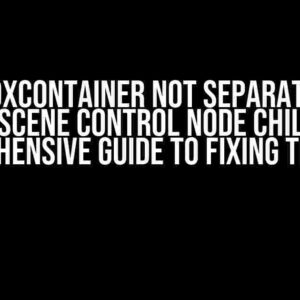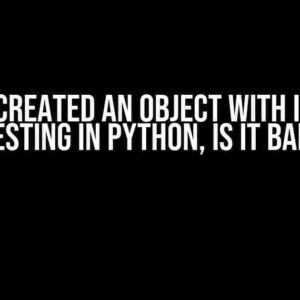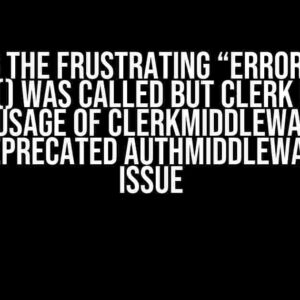If you’re reading this, chances are you’ve stumbled upon the frustrating “Yup Resolver started casting error that type is not assignable” error while working with Yup, a popular JavaScript validation library. Don’t worry, you’re not alone! In this article, we’ll dive into the root causes of this error and provide step-by-step instructions to fix it. So, buckle up and let’s get started!
- What is the “Yup Resolver started casting error that type is not assignable” error?
- Cause 1: Type mismatch between the schema and the value
- Cause 2: Incorrect usage of Yup’s
reffunction - Cause 3: Missing or incorrect type definitions
- Cause 4: Yup version compatibility issues
- Best practices to avoid the “Yup Resolver started casting error that type is not assignable” error
- Conclusion
What is the “Yup Resolver started casting error that type is not assignable” error?
This error typically occurs when there’s a type mismatch between the value being validated and the type expected by the Yup resolver. Yup’s strong typing system is designed to ensure that data is validated correctly, but sometimes, it can be overly pedantic, leading to this error.
Symptoms of the error
When you encounter this error, you might see something like this in your console:
Yup Resolver started casting error that type is not assignable at resolver.js:234 at Array.forEach (<anonymous>) at Object.resolve (resolver.js:219) at Object.validateSync (validate.js:21) ...
The error message itself isn’t very helpful, but don’t worry, we’ll break down the potential causes and solutions.
Cause 1: Type mismatch between the schema and the value
Often, this error arises from a mismatch between the type of the value being validated and the type expected by the Yup schema.
Solution: Verify the schema and value types
Double-check that the type of the value being validated matches the type expected by the Yup schema. For example, if your schema expects a string:
const schema = yup.string().required();
Ensure that the value being validated is indeed a string:
const value = 'Hello, World!'; const isValid = await schema.validate(value);
If the value is not a string, update the schema or coerce the value to the correct type.
Cause 2: Incorrect usage of Yup’s ref function
When using Yup’s ref function to create self-referential schemas, it’s easy to make mistakes that lead to this error.
Solution: Review your ref usage
Make sure you’re using the ref function correctly. For example:
const schema = yup.object().shape({
password: yup.string().required(),
confirmPassword: yup.string().test('passwords-match', 'Passwords must match', function valor {
return valor === this.parent.password;
}),
});
In this example, the ref function is used to reference the parent object’s password property. Ensure that you’re not accidentally creating a circular reference or referencing a non-existent property.
Cause 3: Missing or incorrect type definitions
If you’re using TypeScript or another type system, incorrect or missing type definitions can lead to this error.
Solution: Review and update type definitions
Verify that your type definitions match the actual types used in your code. For example, if you’re using TypeScript:
interface User {
name: string;
email: string;
}
Ensure that your Yup schema reflects the correct types:
const schema = yup.object().shape({
name: yup.string().required(),
email: yup.string().email().required(),
});
Update your type definitions to match the actual types used in your code.
Cause 4: Yup version compatibility issues
Sometimes, using an older version of Yup can lead to compatibility issues that cause this error.
Solution: Update Yup to the latest version
Check your package.json file and update Yup to the latest version:
npm install yup@latest
or
yarn add yup@latest
This might resolve any version-specific issues.
Best practices to avoid the “Yup Resolver started casting error that type is not assignable” error
To avoid this error in the future, follow these best practices:
- Use type definitions (e.g., TypeScript) to ensure accurate type information.
- Verify that your Yup schema accurately reflects the types of the values being validated.
- Use the
reffunction correctly, avoiding circular references and non-existent property references. - Keep your Yup version up-to-date to ensure compatibility with the latest features and bug fixes.
- Test your Yup schemas thoroughly to catch any errors early on.
Conclusion
The “Yup Resolver started casting error that type is not assignable” error can be frustrating, but by following the solutions and best practices outlined in this article, you’ll be well-equipped to tackle this error and ensure smooth validation with Yup. Remember to stay vigilant, keep your types in check, and update your Yup version regularly to avoid compatibility issues.
Happy coding, and may the Yup be with you!
| Cause | Solution |
|---|---|
| Type mismatch between the schema and the value | Verify the schema and value types |
Incorrect usage of Yup’s ref function |
Review your ref usage |
| Missing or incorrect type definitions | Review and update type definitions |
| Yup version compatibility issues | Update Yup to the latest version |
By following these solutions and best practices, you’ll be well on your way to avoiding the “Yup Resolver started casting error that type is not assignable” error and ensuring smooth validation with Yup.
- Verify the schema and value types
- Review your ref usage
- Review and update type definitions
- Update Yup to the latest version
Remember, a well-maintained Yup schema is a happy Yup schema!
Here are 5 Questions and Answers about “Yup Resolver started casting error that type is not assignable” in a creative voice and tone:
Frequently Asked Question
Get the answers to the most common questions about Yup Resolver’s pesky casting error!
What’s the deal with Yup Resolver’s casting error?
Yup Resolver’s casting error occurs when the resolver function returns a value that’s not assignable to the type specified in the schema. This can happen when you’re using a resolver to fetch data from an external source, and the data type returned doesn’t match the expected type.
Why does Yup Resolver care about the type?
Yup Resolver is all about ensuring data validity and integrity. By specifying a type for the resolver function, you’re telling Yup that the returned value should conform to that type. If it doesn’t, Yup will throw an error to prevent invalid data from propagating through your application.
How do I fix the casting error?
The fix depends on the specific situation, but common solutions include updating the resolver function to return the correct type, using type casting or coercion, or adjusting the schema to match the actual data type returned by the resolver. You can also use Yup’s built-in features, like `transform` or `cast`, to manipulate the data and ensure it meets the required type.
Can I disable the casting error?
While it’s technically possible to disable the casting error by setting `strict: false` in the Yup schema, it’s not recommended. Disabling type checking can lead to unexpected behavior and errors down the line. Instead, take the time to resolve the issue and ensure your data meets the required type.
Are there any best practices to avoid this error?
Yes! To avoid Yup Resolver’s casting error, make sure to clearly define the types for your resolvers, use type-safe resolver functions, and test your schema thoroughly. Additionally, consider using tools like TypeScript or Flow to catch type-related errors at compile-time, rather than runtime.




